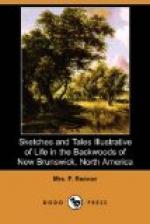Twenty years after her death I made a pilgrimage to the place—the young sapling pines which shaded it had grown to lofty trees—human voice seemed never to have broken in tones of joy or woe the deep solitude around—the long grass waved rank and dark above the walls we had raised, and the red berries hung rich and ripe by the ruined hearthstone. Again, when another twenty years passed, I came to it once more—the weight of age had gathered o’er me, but there lay the buried sunlight of my youth, and the spirit thoughts of other days drew me to it. Again there was a change—a change which told me my own time drew near. The woods were gone long since—the reaper had passed o’er the lowly graves, and knew them not. The last record of my love and of my woe, was gone. Dwellings were raised along the lonely beach, and laden ships floated on the long silent waters. I bade the place farewell for ever, and returned to await in peace and hope my summons to the promised rest.
The old man paused—the dreams of the past had weakened him, and he retired for the night. Next morn we waited long for his presence, but he came not. We sought his chamber, and found him dead. The soul had passed away—one hand was folded on his heart, and oh! the might of earthly love. It clasped a shining braid of silken hair, and something, of which their faint perfume told to be the faded rose leaves—frail memorials of his fondly loved Ella, but lasting after the warm heart which cherished them was cold. He was gone where, if it be not in heaven “a crime to love too well,” his spirit may yet meet with her’s, in that holy light, whose purity of bliss may not be broken by the vain turmoil of earthly feelings. So ends the story of uncle Ethel.
* * * * *
Well, said Grace, after we had discussed Ethel’s melancholy story, although I don’t believe in ghosts, I cannot do away with my faith in dreams, and last night I had a most disagreeable one, which disturbed me much. I thought I had engaged my passage, and when I unclosed my purse to pay down the money, nothing was in it but a plain gold ring and a ruby heart. My money was gone, and, oh! the grief I felt was deeper than waking language can describe. Then, Grace, said I, you must receive consolation for your disagreeable dream, in the words of your own favourite song, “Rory o’More,” that dreams always go by contrary you know, and so I shall read your dream. The plain gold ring means that tie, which, like it, has no ending. The heart has, in all ages, been held symbolical of its holiest feeling, and thus unite love and marriage, and your sorrow will be turned to joy. So I prognosticate your dream to mean. And time told I had foretold aright—for soon after we had arrived in St. John’s, the entrance to which, from the main river, is extremely beautiful, showing every variety of scenery, from the green meadows of rich intervale, where stand white dwellings and orchard trees, to the grey and barren rocks, with cedary plumage towering to the sky.




